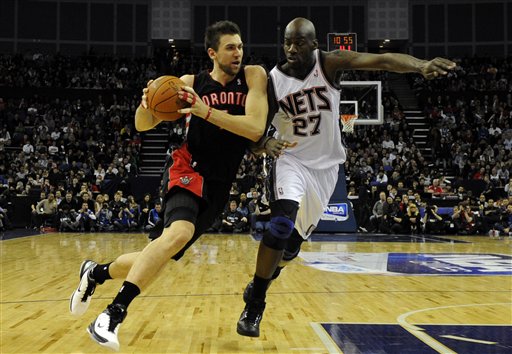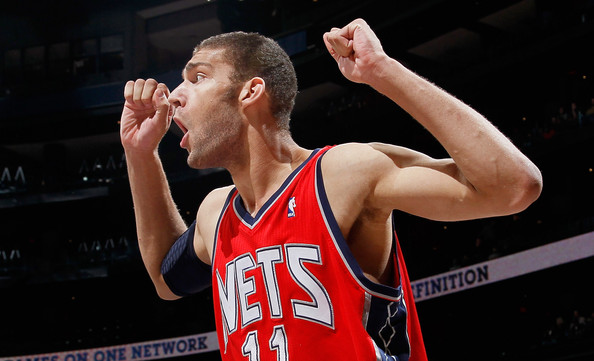
Making the case that a pure scorer who averages 12.7 points per game is indispensable to an NBA team is a tall order. After all, what’s the real value in that? Scoring at a mediocre rate and doing nothing else is, ordinarily, a very replaceable level of production. It’s the consequence hidden behind the numbers that makes Anthony Morrow such an interesting case.
The Nets are no championship contenders, to be sure. Fluctuating between short winning streaks and long losing ones, New Jersey is just trying to keep its head afloat while it waits out its move to Brooklyn. It might seem irrelevant, then, to say that one particular player carries so much weight with the team. In Morrow’s case, the dichotomy might seem particularly pointless, considering the Nets are 5-13 when he doesn’t play and just 9-18 when he does. Over the long term, that’s a largely negligible difference.
The concurrence, however, between Mikhail Prokhorov’s trade embargo and Morrow’s long-anticipated return from a leg injury has the Nets playing seemingly more inspired basketball, which makes it more fun to consider Morrow’s impact. In fact, the Nets are 4-1 since Prokhorov’s press conference and 3-1 since Morrow returned. Let’s look at some of the numbers.
Though Morrow sports a somewhat pedestrian 46.7 field-goal shooting percentage, that is a direct product of the types of shots he takes — mostly three-pointers and long twos. Once you delve into the particulars, though, Morrow’s excellence at shooting the rock begins to manifest itself.
In fact, Morrow has inconspicuously established himself as one of the most deadly midrange shooters in the NBA ranks. According to HoopData.com, Morrow shoots from the 10- to 15-foot range at a 56.7 percent clip, ranking him fifth in the league among guards who play 20 or more minutes a game. And he’s in good company, considering the names preceding him on that list include Steve Nash and Ray Allen. More astoundingly, within that same group of players, Morrow is first overall shooting the long two-pointer (the 16- to 23-foot range) at 51 percent. I have often remarked that Morrow seems never to miss on shots from midrange, and the statistics certainly support that.
Bolstering Morrow’s repertoire is his ability to show up with a big game. Most spot-up shooters consistently provide a helpful point production without the potential for an explosive performance. Morrow is unique is that he reinforces that consistency with 20 to 30 points that he can pull out of his back pocket on any given night. Morrow has scored 19 points or more seven times this season.
Further qualifying Morrow’s big-game ability, though, is his cognizance to not put up points for the sake of putting up points at the expense of efficiency. In those seven games, Morrow has shot 54 percent from the field in those seven games, which included just one 7-of-18 dud.
Delving even deeper into the data, Morrow is one of the most efficient players league-wide on a per-possession basis. Averaging 1.095 points per possession, Morrow finds himself sixth among guards in that category, according to Synergy Sports Technology.
The contrarian, of course, will argue that Morrow neutralizes any offensive boon he provides with subpar defense, and that contrarian might have a point. Morrow surrenders .973 points per possession, which places him in the bottom fifth of the entire league in terms of per-possession defense. To be perfectly honest, that’s a tough criticism to debunk. The best justification that comes to mind is that the Nets, as unspectacular as they are on defense, are overwhelmingly worse on offense. Accordingly, the Nets can suffer his anemia on defense if it means that he provides any notable improvement to the offense.
As even the most stats-beholden analysts will tell you, though, the numbers can’t convey the whole story. In Morrow’s case, observation of his on-court performance is a noteworthy consideration in his value to the Nets. That said, one could argue that Morrow is like the hottie who hangs around with the grenades in order to look comparatively beautiful, and I am not far enough removed from the Nets to tell if that’s really the case.
Still, Morrow carved himself a spot in this season’s short, short history by draining an impossible three-pointer off a last-second inbounds play to propel the Nets to overtime against the Oklahoma City Thunder (even though his excellence was eventually erased by a Stephen Graham brain fart), but it’s not his only accomplishment worth noting.
In general, Morrow tends to hit the big shot when he is left open. In Wednesday’s win over the Memphis Grizzlies, Morrow led the comeback charge, hitting a key three-pointer as well as a midrange pull-up to help close the deal. His proneness to scoring in bunches can’t be ignored, either. In his first game back against the Detroit Pistons, Morrow scored all 10 of his points in a 1:46 stretch spanning the third and fourth quarters.
You must take into account, as well, the effect that Morrow’s presence on the floor can have on the other Nets’ production. Morrow’s shooting ability is a well-known threat around the league, and in order to compensate for it, teams will often leave other options open. It’s very important for Brook Lopez, who is subject to countless double teams given the lack of other options. Since Morrow’s return, though, Lopez is shooting about 52 percent from the field — five percent higher than his season average. You don’t have to go out on a limb to figure that Morrow’s floor-spacing ability might have had a hand in his hot shooting.
Since Morrow’s return from injury, the Nets’ fan base at large is beaming at his play. But allow me to play the devil’s advocate for a moment. It’s possible that the Nets are winning because of an increased sense of focus now that the trade talks are in the rearview mirror and that Morrow’s return is simply an ancillary cause for the improved play — a mere coincidence that he came back when he did. Yeah, the Nets are 3-1 since he returned, but that’s an awfully small sample size. Maybe Anthony Morrow is just a 12.7 PPG scorer who can’t do anything else on either end.
The optimist in me begs to differ. Morrow does so many things that this Nets team needs, making him far and away the best offseason acquisition for the Nets. When Morrow hobbled off, clutching at his leg like a tender ham, the negative effect of his absence could not have been anticipated. Now that he’s back, it is only appropriate to believe his play is key in the Nets’ swaying fortunes.
















